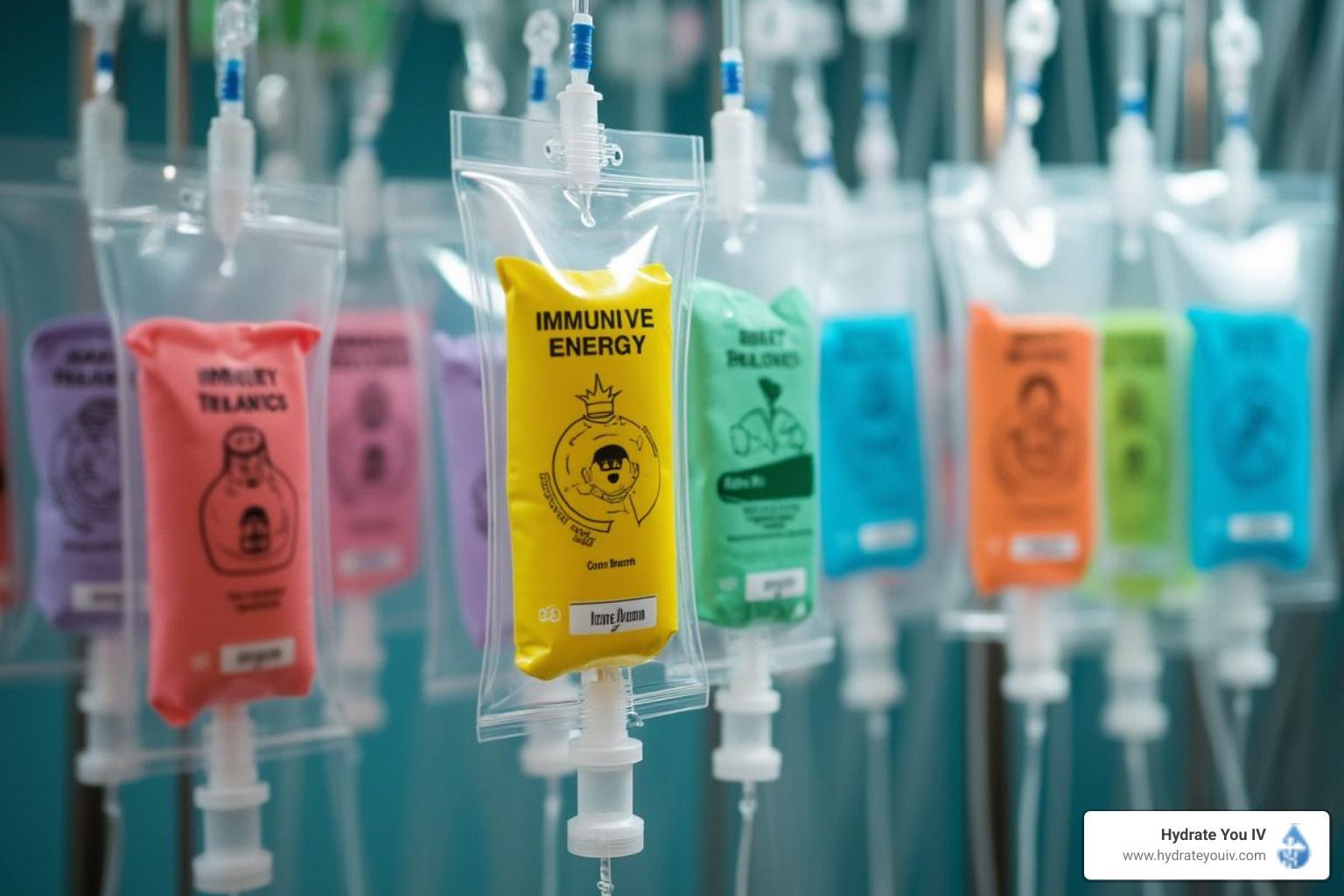IV B Vitamins for Fatigue Relief and Lasting Energy Boost
Say Goodbye to Fatigue: Discover B Vitamin Benefits in IV Therapy

Understanding Fatigue: Causes and Effects
Fatigue is more than just feeling tired after a long day; it can be a persistent condition that interferes with daily activities. Understanding what causes fatigue can empower individuals to seek effective solutions and regain their vitality.
Common causes of fatigue include insufficient sleep, poor nutrition, stress, and medical conditions such as anemia or thyroid disorders. Additionally, emotional factors, including anxiety and depression, can contribute significantly to feelings of fatigue.
The effects of fatigue are far-reaching. Individuals may find it difficult to concentrate at work, lacking motivation to engage in physical activities, or feeling overwhelmed by routine tasks. Long-term fatigue can lead to more severe health problems, both physically and mentally, affecting one’s quality of life.
The Science Behind Fatigue
At a biological level, fatigue is often linked to the depletion of energy reserves within the body. When the body is under stress—be it physical, emotional, or environmental—it uses energy reserves that may not be adequately replenished. This depletion can lead to feelings of exhaustion.
Additionally, neurotransmitters such as serotonin and dopamine play crucial roles in mood regulation and energy levels. A deficiency in these chemicals can further heighten feelings of fatigue, making it essential to maintain balanced nutrition for optimal mental health.
How Fatigue Impacts Daily Life
Living with fatigue can drastically alter one's lifestyle. Individuals may experience difficulty waking up in the morning, leading to tardiness at work or missed responsibilities. Social interactions may become strained as friends and family may not understand the pervasive nature of fatigue.
Moreover, fatigue can create a cycle of inactivity, where one may avoid physical exercise due to tiredness. This laziness can lead to weight gain and further energy depletion, exacerbating the feelings of fatigue. Understanding these implications is crucial in recognizing the importance of treatment options.
The Power of B Vitamins
B vitamins are crucial for converting food into fuel, supporting cellular function, and promoting overall health. These vitamins are water-soluble and play various roles in metabolic processes, making them essential allies in combating fatigue and boosting energy.
Integrating B vitamins into one's diet or through supplementation can aid not only in restoring energy levels but also in improving mood and cognitive function. This nutrient group is vital for maintaining a well-functioning nervous system, which is often compromised in individuals suffering from chronic fatigue.
The Role of B Vitamins in the Body
B vitamins help the body utilize carbohydrates, proteins, and fats efficiently, essential for producing energy. For example, vitamin B1 (thiamine) is vital for glucose metabolism, while B6 is crucial for protein metabolism and cognitive development.
Furthermore, B vitamins support the production of red blood cells, which transport oxygen throughout the body. Sufficient oxygen is necessary for maintaining energy levels, thereby preventing the overwhelming feelings of fatigue that can occur when oxygen supply is low.
Different Types of B Vitamins and Their Functions
- Vitamin B1 (Thiamine): Aids in energy metabolism.
- Vitamin B2 (Riboflavin): Supports cellular function and energy production.
- Vitamin B3 (Niacin): Assists in the conversion of carbohydrates into energy.
- Vitamin B5 (Pantothenic Acid): Essential for synthesizing coenzyme A, crucial for fatty acid metabolism.
- Vitamin B6 (Pyridoxine): Involved in amino acid metabolism and neurotransmitter production.
- Vitamin B7 (Biotin): Important for energy production from carbohydrates and fats.
- Vitamin B9 (Folate): Crucial for DNA synthesis and repair, as well as red blood cell formation.
- Vitamin B12 (Cobalamin): Vital for neurological function and red blood cell formation.
IV Therapy: A Modern Solution
Intravenous (IV) therapy has surged in popularity as a quick and efficient method to deliver essential vitamins directly into the bloodstream. Bypassing the digestive system allows for near-instant absorption, maximizing the benefits for those struggling with fatigue.
This therapy is particularly beneficial for individuals who may have digestive issues that hinder nutrient absorption or for those with busy lifestyles who require a fast-acting solution to restore energy levels.
What is IV Therapy?
IV therapy involves administering fluids, electrolytes, and vitamins directly into a patient's bloodstream through a small catheter. This method allows for precise control over nutrient delivery, ensuring that the body receives everything it needs in the right amounts.
This treatment can be tailored to an individual’s specific needs, addressing various health concerns simultaneously. Clients typically experience immediate benefits, such as renewed energy and improved mental clarity, making it an attractive option for those seeking relief from fatigue.
The Process and Safety of IV Therapy
The process of receiving IV therapy is straightforward. A trained healthcare professional will first assess your needs and determine the appropriate blend of nutrients. After this assessment, the IV is set up, and the solution is administered within a controlled environment to ensure safety and comfort.
While IV therapy is generally safe, it is essential to consult a licensed professional to discuss any potential allergies or medical conditions beforehand. Proper precautions and hygiene practices are followed to minimize risks during the procedure.
B Vitamins in IV Therapy: A Potent Combination
Combining B vitamins with IV therapy creates a powerful treatment option for individuals battling fatigue. This combination enhances nutrient absorption and provides immediate relief from energy depletion.
Furthermore, patients often report fewer side effects when receiving vitamins through IV therapy compared to oral supplementation, as the digestive system's stress is bypassed.
How B Vitamins Enhance IV Therapy
B vitamins play a critical role in energy production, making them ideal candidates for infusion therapies. When included in IV therapy, B vitamins can enhance overall well-being by boosting metabolism and improving cellular function.
Additionally, they contribute to mood stabilization and improved cognitive function, which is invaluable for those grappling with fatigue-related issues. This combination not only eases fatigue but nurtures a sense of rejuvenation and clarity.
Potential Side Effects and Precautions
While B vitamin IV therapy is generally safe, individuals may experience mild side effects such as soreness at the injection site or temporary changes in blood pressure. It is crucial to monitor these reactions and communicate with healthcare providers if any adverse effects occur.
Moreover, patients with specific health conditions or those taking certain medications should consult with healthcare professionals prior to beginning IV therapy to ensure it is suitable for their needs.
The Impact of B Vitamin IV Therapy on Fatigue
Many individuals report significant improvements in fatigue levels following B vitamin IV therapy. Patients often experience increased energy, enhanced mood, and improved overall health. These immediate effects can be highly motivating, encouraging individuals to pursue healthier lifestyles.
Moreover, regular treatments may contribute to long-term benefits, allowing patients to re-engage with activities they previously found exhausting. This renewed vitality can foster a more active and fulfilling life.
Immediate and Long-Term Effects
The immediate effects of B vitamin IV therapy can be felt within a few hours, with many clients reporting heightened energy and mental clarity. This rapid response makes IV therapy a compelling option for those facing high-stress situations or requiring a quick energy boost.
In the long term, regular B vitamin IV therapy may help maintain consistent energy levels and promote better overall health. Individuals can experience a reduction in fatigue episodes and find it easier to maintain a balanced lifestyle.
Who Can Benefit from B Vitamin IV Therapy?
B vitamin IV therapy can benefit a wide range of individuals. Those suffering from chronic fatigue, busy professionals, athletes, and anyone recovering from illness can see positive results from this treatment.
Additionally, individuals with dietary restrictions or malabsorption issues may find IV therapy particularly advantageous, as it provides the necessary vitamins efficiently and effectively. Overall, many people can enhance their wellness and say goodbye to fatigue with this innovative treatment.











